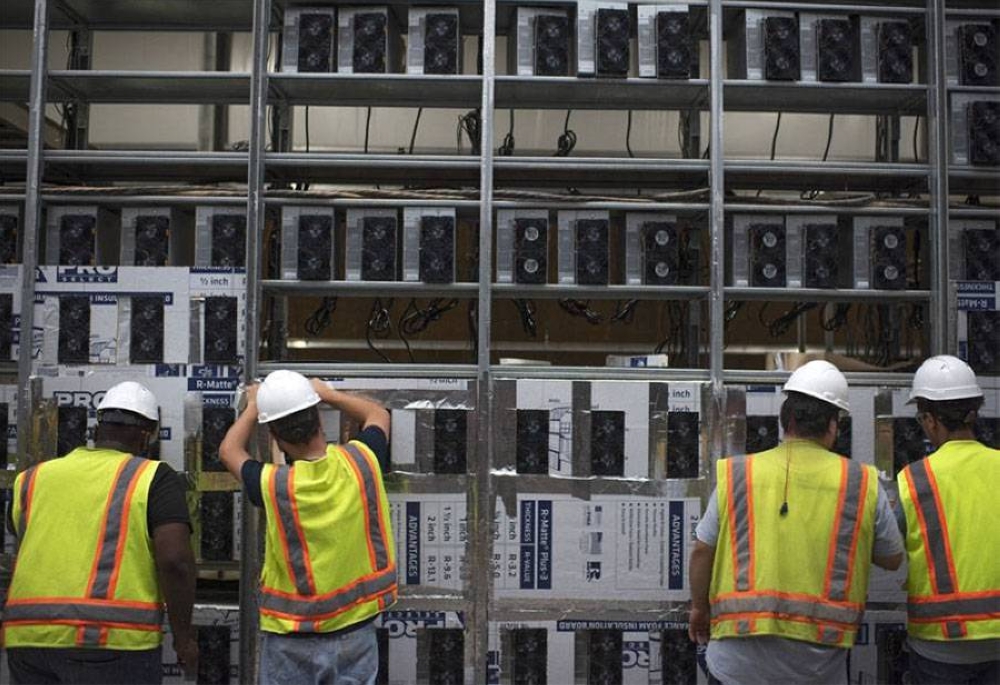Revisit safeguards against crypto rush

In this file photo taken on October 09, 2021, workers install a new row of Bitcoin mining machines at the Whinstone US Bitcoin mining facility in Rockdale, Texas. AFP PHOTO
FILIPINOS should be cautious about investing in cryptocurrencies like Bitcoin. Likewise, the central bank should review its policies on cryptocurrencies and on decentralized finance or DeFi in general to protect consumers not only from scams, but also from making poor investment decisions.
There has been so much hype about cryptocurrencies over the years. And our concern stems precisely from their growing popularity even among Filipinos. Some may be rushing to invest in them without actually understanding the concepts of these new instruments and the risks involved. For instance, many might not realize that not all cryptocurrencies are Bitcoins, as there are more than 6,000 others available.
If one thinks about it, the very concept of a cryptocurrency seems troubling because it was designed to operate outside the formal financial system and beyond the control of government regulators. That alone should raise red flags given the problems with money laundering and various other illegal dealings of terrorists and criminals everywhere.
Another troubling feature is the anonymity of buyers and sellers allowed in the new system. That undermines the know-your-customer policy imposed by regulators, partly to prevent fraud and other crimes.
Of course, the idea behind these features was to simply facilitate transactions or more technically, peer-to-peer exchanges. But it is not hard to imagine that anything beyond the reach of regulators could attract opportunists in the criminal underworld.
More in government, not just those in law enforcement, should be concerned about the integrity and stability of the Philippine financial system and the risks posed by cryptocurrencies and DeFi. It is a digital infrastructure ecosystem based on blockchain that seems to be emerging as a substitute for formal financial intermediaries like banks and brokerages. Blockchain, of course, is like a digital ledger that claims to be impregnable to hackers, which partly explains its appeal.
Central banks, in our case the Bangko Sentral ng Pilipinas (BSP), play an integral role in any economy. They are responsible not only for economic growth and development, but also for balancing inflation and unemployment. Of course, many recognize central banks as regulators of the banking system and lenders of last resort, among other things.
As such, policymakers and others in authority should be protective of BSP and its ability to function effectively. While it may be wrong to swim against the current, so to speak, and resist technological advances, policies should also evolve at a pace that keeps up with the developments.
Financial literacy
Another concern has to do with consumer protection, which applies to investors in cryptocurrencies and users of DeFi. Admittedly, they seem alluring to people looking to preserve or grow their wealth.
Because of their popularity, these technological advances have even spread to other sectors, particularly the art world that now offers non-fungible tokens or NFTs. They are minted on blockchain in a process paid for with a cryptocurrency, typically Ethereum.
All these ideas and terms do sound fancy; even mysterious. But they can also be frightening.
The “crypto” rush evokes memories of an economic disaster a century ago. In the 1920s, Americans risked their life savings to invest in a bull market even though many had little understanding of intrinsic value and how the bourse actually worked. They were simply drawn to an opportunity to make a quick fortune. Of course, the US stock market crashed later that decade, and the impact was global.
Something similar could happen today. People are rushing to cryptocurrencies even though they have no intrinsic value and only superficial understanding of them. Like investors in the 1920s, people today can hardly resist any possibility of becoming wealthy in a short period.
Warren Buffett, arguably the best investor today, said the value of cryptocurrencies was based largely on the demand of the next buyers. He describes it as like a bubble although he did not use that term.
For its part, the BSP has issued statements and materials that educate the public about cryptocurrencies and blockchain. More can always be done though. The best defense against losing money in cryptocurrencies and new technologies related to them may be financial literacy.